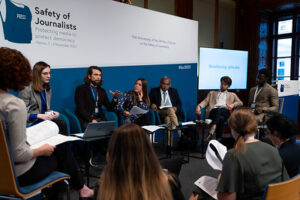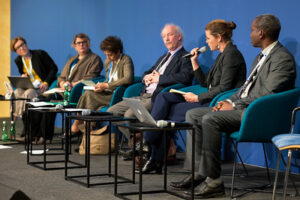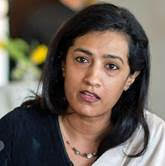By William Horsley, CFOM International Director and Executive Committee member of the Commonwealth Journalists Association
12 December 2022
A meeting of Commonwealth Law Ministers in Mauritius ended on November 25 with agreement (see para. 24) to adopt a set of Commonwealth Principles on freedom of expression and the role of the media in good governance. The decision was unanimous and the ministers have recommended the Principles for Commonwealth heads of state and government to consider at their next meeting in Samoa in 2024.
The adoption of the Media Principles is a significant moment for the Commonwealth’s 56 member countries, but practical and effective actions must follow. Political leadership and a self-critical approach will be needed to fulfil the still hollow public commitment made in the Commonwealth Latimer House Principles: to ensure that professional media is “protected by law in its freedom to report and comment on public affairs”.
It is also a major achievement for the Commonwealth Journalists Association and the five other Commonwealth-affiliated professional groups which took the initiative in 2018 by publishing a carefully-crafted Media Principles document. It grew out of a wide consultation process and careful regard for existing Commonwealth commitments and international standards relating to the role of the media in a functioning democracy. At the public launch of the Principles shortly before the 2018 London CHOGM they were warmly applauded by civil society voices across the Commonwealth.
But it took more than three years of tireless work, persistent lobbying and many setbacks before the professional associations could gain the serious attention of the Secretariat and member states. Last month, though, the Law Ministers expressed gratitude to the Commonwealth Accredited Organisations for their “dedication and valuable contribution” in developing the Draft Principles, which formed a basis for the final Principles text after being examined and revised in 2021 by a committee of specialist officials representing member states.

Commonwealth law ministers at their meeting in Mauritius
The active support of willing states was crucial to the decisions taken in Mauritius. But the Commonwealth’s collective neglect of these pressing issues, in the face of rising international concerns and a clamour from key stakeholders for remedial action, has contributed to a climate of oppression and even fear among journalists in all regions of the Commonwealth who seek to report in the public interest. A Media Freedom Summary Report commissioned by the Commonwealth Foundation ahead of the ministers’ meeting presented evidence that the overall record of Commonwealth countries on the rights of free and independent media are in serious disrepair and urgent need of correction.
The Report highlighted hostile conditions in various member countries and regions arising from acts of violence and intimidation, censorship. state capture of media, and aggressive denigration of journalists by public figures. Among the areas that should be of prime concern for member states, the Report said, are the arbitrary misuse of law, overly restrictive legislation and high levels of impunity – as high as 96 percent in cases involving killings of journalists.
Turning words into effective actions
So what next? By adopting the Media Principles, ministers have acknowledged the crucial importance of the media’s role as the fourth estate in sustaining democratic society and the rule of law. But they chose not to act on two significant requests which civil society groups communicated to them in writing a year ago. The ministers were asked, first, for a public commitment to ensure that the commitments on paper would be implemented through practical follow-up actions. Secondly, they were asked to acknowledge that their civil society partners hold specific reservations about the text and have asked for a commitment to future reviews of the current text to address shortcomings as well as new challenges.
The wording of international Guidelines or “soft law” documents of this kind really matters, both as a statement of political intent and also because national courts may take account of them as a statement of agreed Commonwealth standards in adjudicating cases which hang on the rights of a journalist to gather and publish critical facts and opinions in the public interest. The six concerned civil society organisations pointed to concerns about a perceived watering down of commitments, especially regarding the repeal of over-restrictive laws (Principle 2), the role of independent oversight bodies (Principle 11), and several points of jurisprudence where the current text may be seen as falling short of the highest international standards of protection for free expression.
However the revised text contains two passages which explicitly require coordinated action by member states. The final paragraph (Principle 11) states “Member states should promote the widest possible awareness of these principles and ensure their observance”. And Principle 7 on The safety of journalists and media workers says “…states should put in place effective laws and measures to establish a safe and enabling environment” for them to work without fear of violence or various interferences; and that “Member states should ensure that state organisations and agents, in particular law enforcement officers and military personnel, promote and respect human rights and humanitarian law obligations…”
A Commonwealth action plan for the safety of journalists?
Commonwealth Law Ministers can create robust and purposeful “Plans of Action” to implement their decisions. The Mauritius meeting produced a Plan of Action to implement a Law Ministers Declaration on Equal Access to Justice. It will involve empirical research, reviews of legislation, drafting of model laws, and a range of implementation measures, to be coordinated by the Secretariat. Yet so far there is no indication that the topical and well-aired issues concerning the criminalisation of journalists’ work, legal harassment, or the shocking levels of impunity reported by UNESCO in relation to attacks against journalists, are to be taken into account under this Action Plan. Why ever not?


Above images: Delegates at the Vienna conference on journalism safety. Image credit: Bundesministerium für europäische und internationale Angelegenheiten
The CJA, like other civil society organisations, believes in constructive dialogue as well as criticism of the Commonwealth. In that spirit the association has sought over the past six years to assist and persuade the institutional Commonwealth to turn words into meaningful action, or it must face the charge of double standards. The Commonwealth Ministerial Action Group (CMAG) is the only mechanism with a mandate to rein in member states’ abuses of power to disempower the civil society and media space through bad laws or arbitrary constraints, and it has completely failed. However, other tried and tested mechanisms are available for the Commonwealth to adopt. They include:-
- The appointment of an independent Rapporteur – or similar figure with a suitable mandate – like the existing regional Special Rapporteurs for Africa, Latin America and the OSCE (Europe and North America).
- Accepting UNESCO’s open offer to the Commonwealth of multiple forms of support to become an active partner – or at least engage with — the UN Plan of Action on the Safety of Journalists and the Issue of Impunity. Its first ten years of operation were marked at a major United Nations-hosted Multi-stakeholder Meeting in Vienna in early November. But the Commonwealth was absent.
- A new and dynamic force offers to assist: the sixteen international lawyers who make up the High Level Panel of Legal Experts on Media Freedom have advertised their willingness to assist governments and other entities which request their support to review domestic laws or devise model laws, and give other expert advice to bring laws and practices into line with the highest international legal standards. The Panel was set up in 2019 at the time of the birth in London of a Media Freedom Coalition of UN member states which now includes 11 Commonwealth countries. All 50 Coalition members have signed a public pledge to put their own house in order in terms of protecting the safety and legitimate rights of journalists, and to speak and act to oppose targeted attacks of all kinds directed against media workers.

Above image: Karuna Nundy
Two Panel members have reached out with calls for the Commonwealth’s Secretariat and member states to act. Karuna Nundy, an Advocate at the Supreme Court of India, wrote a timely article in Just Security. She calls the Media Principles an opportunity to undo excessive restraints on press freedom, which in many Commonwealth states grow out of “colonial laws and oppressive legal cultures” – particularly the UK-devised laws on sedition and criminal defamation still on the books in many Commonwealth jurisdictions.
Can Yeginsu, a UK-based lawyer and deputy chair of the High Level Panel, spoke out at the UN conference on journalists’ safety in Vienna. After noting that the Commonwealth is still one of the multinational organisations which lack effective mechanisms of “enforcement capability”, he urged its leaders to address the 96 percent rate of impunity (denial of justice) when journalists have been killed for their work in member states. He called on Commonwealth Law Ministers to make good use of the Media Principles because, he said, such levels of impunity were “completely unacceptable”. Yeginsu suggested the way forward would be by giving “teeth” to the Principles to make them effective.
CJA members across the Commonwealth may take encouragement from the words and the authority vested in members of the international Legal Panel, whose role is to advise all states, and especially to mobilise those who have joined the Media Freedom Coalition and signed its pledge. The Commonwealth has made a start with the Media Principles. Now it is time to make them real.
The authors of the 2018 Commonwealth Media Principles were representatives of the Commonwealth Journalists Association, Commonwealth Lawyers Association, Commonwealth Legal Educators Association, Commonwealth Human Rights Initiative and Institute of Commonwealth Studies. The Secretariat participated as an observer.
The Commonwealth members of the Media Freedom Coalition are Australia, Belize, Botswana, Canada, Cyprus, Ghana, Guyana, Maldives, New Zealand, Sierra Leone and the United Kingdom
